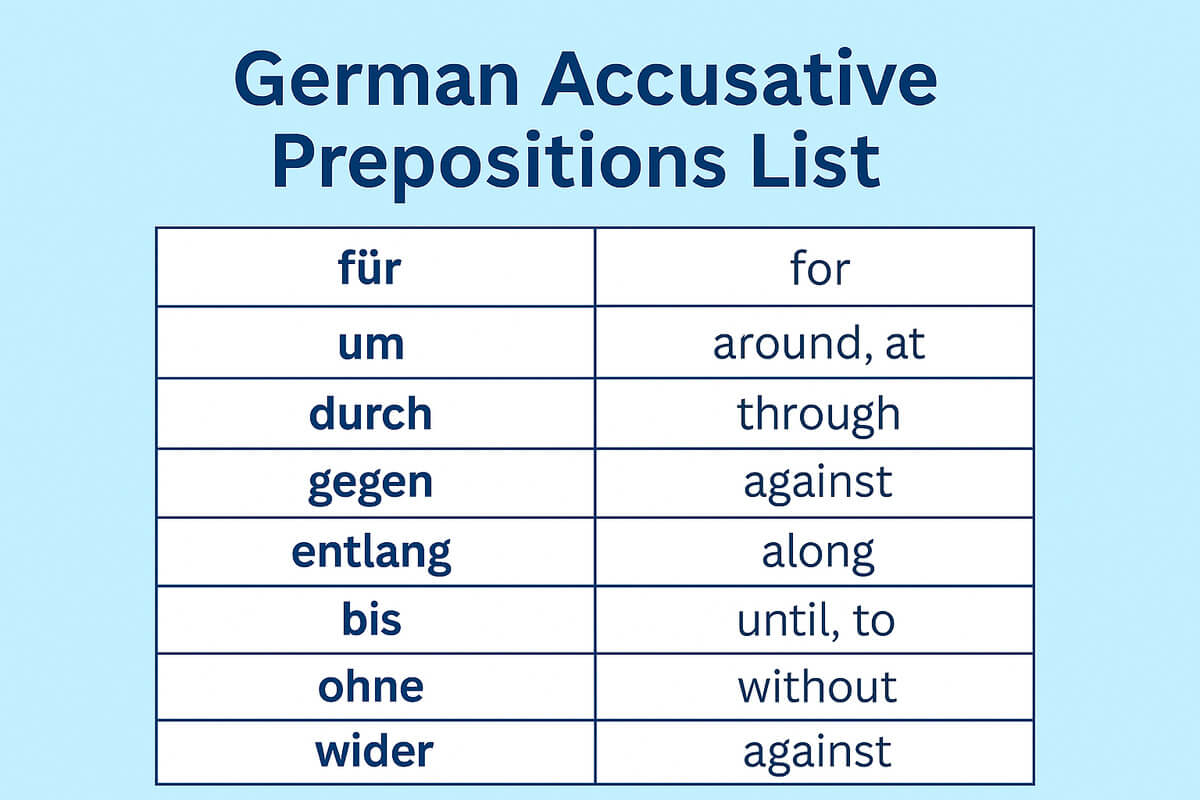Table of Contents
- für = for
- um = round, around
- gegen = against
- durch = through
- ohne = without
- bis = until, to
- entlang = along
- wider = against, contrary to something
In this guide, you’ll learn how to use each of these prepositions correctly with real examples, common mistakes, and tips to help you practice and remember them easily.
What Are German Accusative Prepositions?
Accusative prepositions always require the noun or pronoun they refer to be in the accusative case. These prepositions determine the grammatical structure of sentences.
Since German cases can be tricky to grasp, focusing on learning the dative and accusative prepositions first helps minimize errors. By mastering them, you’ll have a better understanding of how to correctly apply cases in everyday conversation.
The Role of Prepositions in German Grammar
Prepositions are little words and placed in front of nouns or pronouns. Prepositions in German, much like in English, play a vital role in explaining the relationship between different parts of a sentence. They help to provide context, indicate direction, time, and many other aspects that are essential for conveying meaning accurately.
Accusative Prepositions List with Examples
| Preposition | Example sentence in German | English translation |
| für (for) | Das Geschenk ist für die Mutter. | The gift is for the mother. |
| um (around/at) | Sie bitten um Hilfe, weil sie es alleine nicht schaffen. | They ask for help because they can’t do it alone. |
| gegen (against) | Sie protestieren gegen die neue Verordnung. | They are protesting against the new regulation. |
| durch (through) | Sie fahren durch den Tunnel, um die Stadt zu erreichen. | They drive through the tunnel to reach the city. |
| ohne (without) | Tina ging ohne Jacke aus dem Haus. | Tina left the house without her jacket. |
| bis (until, to) | Er liest jeden Tag bis spät in die Nacht. | He reads late into the night every day. |
| wider (against/contrary to) | Seine Entscheidung war wider den Rat seiner Eltern. | His decision was against the advice of his parents. |
| entlang (along) | Wir spazieren die Straße entlang. | We are walking along the street. |
Overview of German Accusative Prepositions
The primary accusative prepositions in German include “für” (for), “um” (around), “gegen” (against), “durch” (through), “bis” (until, to), and “ohne” (without). Each of these prepositions has specific uses and connotations, making them indispensable in everyday German communication.
Für
“Für” is one of the most commonly used accusative prepositions in German. It’s typically used to express a benefit or a purpose, similar to the English preposition “for”.
Examples
- Ich habe ein Geschenk für dich. (I have a present for you.)
- (Ich freue mich für dich. I am happy for you.)
Um
“Um” is another crucial accusative preposition, often used to indicate a time frame or that you are moving around something. Its correct usage can be a bit tricky.
Examples
- Ich komme um 17 Uhr. (I’ll be there at 5 pm.)
- Wir gehen um den See. (We walk around the lake.)
The first example is referring to time.
Gegen
“Gegen” is a versatile preposition used to express opposition, contrast, or a physical direction towards something.
Examples
- Er trat kraftvoll gegen den Ball. (He kicked the ball powerfully.)
- Sie lehnt sich gegen die Wand. (She leans against the wall.)
Durch
“Durch” is typically used to indicate movement through a space or medium. This preposition is vital for describing actions and navigations in everyday conversations and writings in German.
Examples
- Das Licht scheint durch das Glas. (The light shines through the glass.)
- Der Erfolg kam durch harte Arbeit. (Success came through hard work.)
Ohne
“Ohne” plays a unique role in German sentences, often used in negative contexts to mean “without”.
Examples
- Sie reisten ohne Gepäck. (They traveled without luggage).
- Der Gerät wird ohne Gewährleistung verkauft. (The device is sold without warranty.)
Bis
“Bis” is a versatile preposition and conjunction in the German language, often translating to “until” or “by” in English. Its usage spans various contexts, from indicating time frames to specifying limits or destinations.
One of the primary uses of “bis” is to denote the endpoint of a time period. It sets a boundary up to which an action or state is relevant. Although less common than its temporal preposition use, “bis” can also indicate a physical limit or destination.
Examples
- Der Pfad führt uns bis an den Rand des Waldes. (The path leads us to the edge of the forest.)
- Sie studiert jeden Tag bis in die späten Abendstunden. (She studies every day until late in the evening.)

Wider
„Wider“ is a formal accusative preposition in German. It means “against” in the sense of opposing something, such as rules, laws, or logical reasoning. It is mainly used in written or formal contexts.
Examples
Er handelt wider besseres Wissen. (He acts against better judgment.)
Das verstößt wider das Gesetz. (That violates the law.)
Entlang
„Entlang“ means “along” and takes the accusative case when placed after the noun. It’s commonly used to describe movement along a path, road, river, or border.
Examples
Wir gehen den Fluss entlang. (We are walking along the river.)
Sie fährt die Straße entlang bis zur Kreuzung. (She drives along the street up to the intersection.)
Common Mistakes
Mastering German accusative prepositions can be challenging, especially for learners who are used to different grammatical structures in their native language. Below are the most common mistakes learners make and how to correct them.
1. Using the Wrong Case
Many learners mistakenly use the dative case after accusative prepositions, especially if they are more familiar with dative prepositions.
Incorrect:
❌ Ich gehe durch der Park.
Correct:
✅ Ich gehe durch den Park. (I walk through the park.)
2. Confusing “für” (for) with “von” (from)
English speakers often confuse für (for) and von (from) since both can express purpose or relationships.
Incorrect:
❌ Das Geschenk ist von meine Mutter. (The gift is for my mother.)
Correct:
✅ Das Geschenk ist für meine Mutter. (The gift is for my mother.)
📝 Tip:
- Für = used when something is intended for someone.
- Von = used when something comes from someone.
3. Forgetting to Decline the Article
When using accusative prepositions, masculine articles and pronouns change in the accusative case.
Incorrect:
❌ Er kauft ein neuer Mantel für sein Vater. (He buys a new coat for his father.)
Correct:
✅ Er kauft einen neuen Mantel für seinen Vater.
4. Misusing “um” with Time Expressions
Many learners assume that “um” (around/at) can be used with all time expressions. However, “um” is only for specific times, not days or dates.
Incorrect:
❌ Ich habe Geburtstag um Montag.
Correct:
✅ Ich habe am Montag Geburtstag. (I have my birthday on Monday.)
5. Incorrect Word Order
The standard word order of a main clause places the verb at the 2nd position.
Incorrect:
❌ Für meinen Bruder ich habe ein Geschenk gekauft.
Correct:
✅ Ich habe ein Geschenk für meinen Bruder gekauft.
✅ Für meinen Bruder habe ich ein Geschenk gekauft.
Tips and Tricks
Below are practical tips to help you remember them effectively and use them correctly in conversations.
1. Memorize the Accusative Prepositions with Mnemonics
One well-known method—also recommended by the BBC in their German grammar guide — is to remember the word:
“FUDGEBOW” (Für, Um, Durch, Gegen, Entlang, Bis, Ohne, Wider).
This covers all accusative prepositions in a single memory aid.
2. Pay Attention to Masculine Nouns
In the accusative case, only masculine nouns change. If a noun is masculine, “der” becomes “den”, and “ein” becomes “einen”.
3. Use Accusative Prepositions in Daily Conversations
Practicing accusative prepositions in real conversations helps you remember them faster. Try using them in simple sentences when talking about travel, shopping, or daily plans.
4. Use Flashcards and Quizzes for Quick Practice
Flashcards and quizzes are great for reinforcing memory. Write the preposition on one side and an example sentence on the other. You can also take online excercises:
5. Practice Writing Sentences with Accusative Prepositions
Writing your own sentences helps you apply accusative prepositions correctly. Start with simple sentences and gradually build longer phrases.
💡 Example Exercise:
Complete the sentences with the correct preposition:
- Ich interessiere mich ___ Geschichte. (für, um, durch)
- Wir laufen ___ den Park. (durch, bis, ohne)
- Sie kämpft ___ Diskriminierung. (gegen, für, ohne)
Answers:
- für
- durch
- gegen
German Accusative Prepositions Quizzes
Quizzes are a great way to practice and reinforce your skills. Test your knowledge with these interactive exercises:
1. Quiz on Accusative Prepositions
This quiz helps you identify and use the correct prepositions in various sentences.
➡️ Start the Quiz
2. Dative vs. Accusative Quiz
Some prepositions require different cases. This quiz helps you understand the difference.
➡️ Try the Quiz
Conclusion and Key Takeaways
- German accusative prepositions are crucial for constructing grammatically correct sentences.
- Understanding the difference between the accusative case and dative cases is essential.
- Regular practice is key to mastering German prepositions.
FAQ
What are accusative prepositions?
These are prepositions that always come with the accusative case:
- Für, um, gegen, durch, ohne, bis
How to learn German Prepositions?
Learning prepositions takes time. It makes sense to focus first on dative and accusative prepositions, then on two-way and genitive ones.
How does this topic relate to the cases in German?
- Learning prepositions has an influence on which case you need, which is why they are so important
What are Dative prepositions?
Dative prepositions always come with the dative case: mit ,bei, von, seit, zu, außer, nach, gegenüber, aus, ab.
Do genitive prepositions play the same role?
- No, the genitive case and genitive prepositions are less important for the spoken language, but they are still important for the written language.
What are two-way prepositions?
- Either the accusative or dative are needed for certain prepositions also known as two-way prepositions.
Can a preposition have an impact on the adjective ending?
- There is a relation between the ending of an adjective in German and the prepositions.

